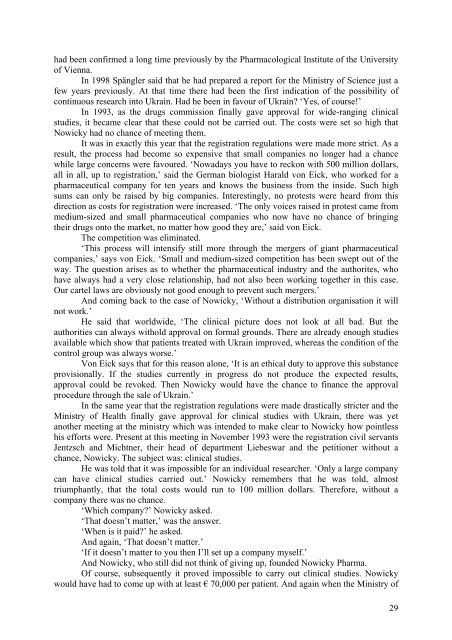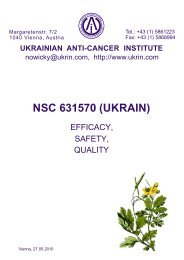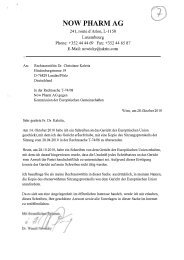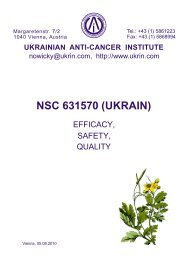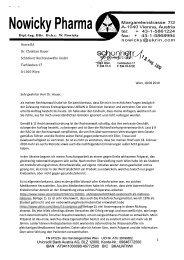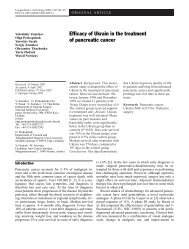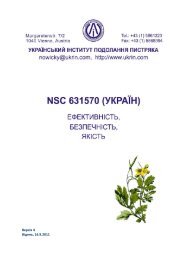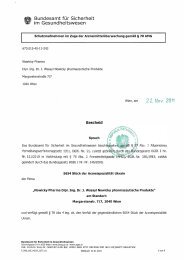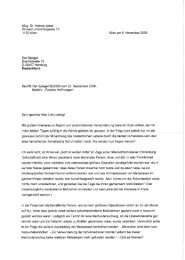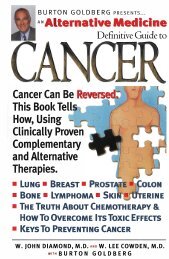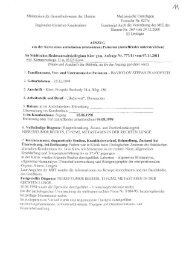Criminal Story of a Prevention - Ukrainian Anti Cancer Institute
Criminal Story of a Prevention - Ukrainian Anti Cancer Institute
Criminal Story of a Prevention - Ukrainian Anti Cancer Institute
You also want an ePaper? Increase the reach of your titles
YUMPU automatically turns print PDFs into web optimized ePapers that Google loves.
had been confirmed a long time previously by the Pharmacological <strong>Institute</strong> <strong>of</strong> the University<br />
<strong>of</strong> Vienna.<br />
In 1998 Spängler said that he had prepared a report for the Ministry <strong>of</strong> Science just a<br />
few years previously. At that time there had been the first indication <strong>of</strong> the possibility <strong>of</strong><br />
continuous research into Ukrain. Had he been in favour <strong>of</strong> Ukrain? ‘Yes, <strong>of</strong> course!’<br />
In 1993, as the drugs commission finally gave approval for wide-ranging clinical<br />
studies, it became clear that these could not be carried out. The costs were set so high that<br />
Nowicky had no chance <strong>of</strong> meeting them.<br />
It was in exactly this year that the registration regulations were made more strict. As a<br />
result, the process had become so expensive that small companies no longer had a chance<br />
while large concerns were favoured. ‘Nowadays you have to reckon with 500 million dollars,<br />
all in all, up to registration,’ said the German biologist Harald von Eick, who worked for a<br />
pharmaceutical company for ten years and knows the business from the inside. Such high<br />
sums can only be raised by big companies. Interestingly, no protests were heard from this<br />
direction as costs for registration were increased. ‘The only voices raised in protest came from<br />
medium-sized and small pharmaceutical companies who now have no chance <strong>of</strong> bringing<br />
their drugs onto the market, no matter how good they are,’ said von Eick.<br />
The competition was eliminated.<br />
‘This process will intensify still more through the mergers <strong>of</strong> giant pharmaceutical<br />
companies,’ says von Eick. ‘Small and medium-sized competition has been swept out <strong>of</strong> the<br />
way. The question arises as to whether the pharmaceutical industry and the authorites, who<br />
have always had a very close relationship, had not also been working together in this case.<br />
Our cartel laws are obviously not good enough to prevent such mergers.’<br />
And coming back to the case <strong>of</strong> Nowicky, ‘Without a distribution organisation it will<br />
not work.’<br />
He said that worldwide, ‘The clinical picture does not look at all bad. But the<br />
authorities can always withold approval on formal grounds. There are already enough studies<br />
available which show that patients treated with Ukrain improved, whereas the condition <strong>of</strong> the<br />
control group was always worse.’<br />
Von Eick says that for this reason alone, ‘It is an ethical duty to approve this substance<br />
provisionally. If the studies currently in progress do not produce the expected results,<br />
approval could be revoked. Then Nowicky would have the chance to finance the approval<br />
procedure through the sale <strong>of</strong> Ukrain.’<br />
In the same year that the registration regulations were made drastically stricter and the<br />
Ministry <strong>of</strong> Health finally gave approval for clinical studies with Ukrain, there was yet<br />
another meeting at the ministry which was intended to make clear to Nowicky how pointless<br />
his efforts were. Present at this meeting in November 1993 were the registration civil servants<br />
Jentzsch and Michtner, their head <strong>of</strong> department Liebeswar and the petitioner without a<br />
chance, Nowicky. The subject was: clinical studies.<br />
He was told that it was impossible for an individual researcher. ‘Only a large company<br />
can have clinical studies carried out.’ Nowicky remembers that he was told, almost<br />
triumphantly, that the total costs would run to 100 million dollars. Therefore, without a<br />
company there was no chance.<br />
‘Which company?’ Nowicky asked.<br />
‘That doesn’t matter,’ was the answer.<br />
‘When is it paid?’ he asked.<br />
And again, ‘That doesn’t matter.’<br />
‘If it doesn’t matter to you then I’ll set up a company myself.’<br />
And Nowicky, who still did not think <strong>of</strong> giving up, founded Nowicky Pharma.<br />
Of course, subsequently it proved impossible to carry out clinical studies. Nowicky<br />
would have had to come up with at least € 70,000 per patient. And again when the Ministry <strong>of</strong><br />
29


